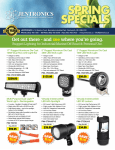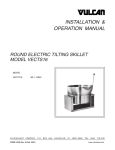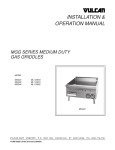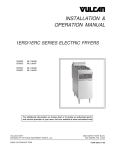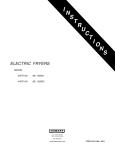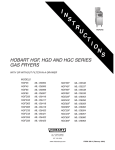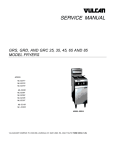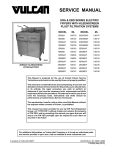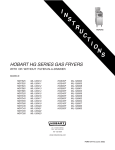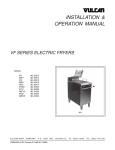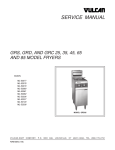Download Vulcan-Hart SPER1 ML-52918 Specifications
Transcript
INSTALLATION & OPERATION MANUAL SPER1 & SPER2 ELECTRIC FRYERS MODEL SPER1 SPER2 SPER0 Frymate ML-52918 ML-52919 ML-52920 SPER1 & 2 VULCAN-HART COMPANY, FORM 30729 Rev. A (1-95) P.O. BOX 696, LOUISVILLE, KY 40201-0696, TEL. (502) 7 7 8 - 2 7 9 1 Installation, Operation and Care of MODEL SPER1 & SPER2 ELECTRIC FRYERS PLEASE KEEP THIS MANUAL FOR FUTURE REFERENCE GENERAL Your Vulcan fryer is produced with quality workmanship and material. Proper installation, usage and maintenance of your fryer will result in many years of satisfactory performance. Vulcan-Hart Company suggests that you thoroughly read this entire manual and carefully follow all of the instructions provided. INSTALLATION Before installing, verify that the electrical service agrees with the specifications on the rating plate located on the inside of the fryer door panel. If the supply and equipment requirements do not agree, do not proceed with the installation. Contact your dealer or Vulcan-Hart Company immediately. UNPACKING This fryer was inspected before leaving the factory. The transportation company assumes full responsibility for safe delivery upon acceptance of the shipment. Immediately after unpacking, check for possible shipping damage. If the fryer is found to be damaged, save the packaging material and contact the carrier within 15 days of delivery. Open the cardboard box containing component parts and check quantities. For both Models SPER1 and SPER2 there should be (2) baskets, (1) clean-out rod, and (2) basket hangers. LOCATION The fryer may be installed at 0" clearance from the back or side walls. Position the fryer for easy accessibility for service. —2— INSTALLATION CODES AND STANDARDS Your Vulcan fryer must be installed in accordance with: 1. State and local codes. 2. The National Electrical Code, ANSI/NFPA No. 70 (latest edition). Copies may be obtained from The National Fire Protection Association, Batterymarch Park, Quincy, MA 02269. 3. NFPA Standard #96. LEVELING Place a carpenter's level on top of the fryer and level the fryer front-to-back and side-to-side by turning the adjustable legs. If your fryer is equipped with the optional non-adjustable casters, the fryer must be placed on a level surface. ELECTRICAL CONNECTIONS WARNING: ELECTRICAL AND GROUNDING CONNECTIONS MUST COMPLY WITH THE APPLICABLE PORTIONS OF THE NATIONAL ELECTRICAL CODE AND/OR OTHER LOCAL ELECTRICAL CODES. WARNING: DISCONNECT ELECTRICAL POWER SUPPLY AND PLACE A TAG AT THE DISCONNECT SWITCH TO INDICATE THAT YOU ARE WORKING ON THE CIRCUIT. Place fryer as near to its final position as possible. Connect 3-phase line to X, Y and Z of terminal block. To reach terminal block, remove electric cover plate. For each 151/2" section, a 3-phase supply line capable of handling 16 KW at the fryer's rated voltage (208, 240, 480) is required. A hood ventilator interlock should be connected to 1 and 2 on the 4-pole barrier strip. 1 and 2 go to a set of dry contacts on the power switch. (3/4 HP fan maximum, if needed.) A wiring diagram is located inside the front door panel. —3— OPERATION WARNING: HOT OIL AND PARTS CAN CAUSE BURNS. CLEANING AND SERVICING THE FRYER. USE CARE WHEN OPERATING, BEFORE FIRST USE Cleaning Clean the fryer thoroughly, following the procedures described in this manual under CLEANING — WEEKLY OR AS REQUIRED. Clean all fryer accessories. Rinse all parts thoroughly after cleaning and wipe dry. Seasoning Light seasoning of the backsplash area is required to avoid possible surface corrosion. With a soft, lint-free cloth, apply a thin layer of cooking oil over entire backsplash area. This should also be done after every cleaning. CONTROLS (Fig. 1) Power On Light Trouble Light High Limit Lights Temperature Controller Fry / Melt Switch MODEL SPER2 Fig. 1 —4— Heating Light Power Switch PL-40545-1 POWER SWITCH — Controls electric supply to fryer (Optional - hood ventilator to interlock.) POWER ON LIGHT — Indicates when electric supply is on. TEMPERATURE CONTROLLER — Maintains frying temperature by controlling power supply. HEATING LIGHT — When on, indicates temperature control is calling for power to the elements. FRY/MELT SWITCH — Controls melting or frying cycle. Use MELT cycle position to melt solid shortening. When melted, turn switch to FRY position, with thermostat set at desired frying temperature. MELT cycle not needed with liquid shortening. Option: Leave Fry/Melt Switch in MELT mode. When shortening temperature reaches 135°F, temperature control automatically overrides MELT mode and normal FRY mode begins. FIRST HIGH LIMIT LIGHT — When on, indicates first high limit thermostat has shut fryer down. (Reset not required.) SECOND HIGH LIMIT LIGHT — When on, indicates second high limit thermostat has shut fryer down. (Reset required.) To reset, push reset button on back of the element head (see Fig. 3 on page 9). TROUBLE LIGHT — Indicates fryer has been shut down by second high limit thermostat. ADDING SHORTENING If replacing shortening, place the block of shortening in the room with the fryer for 1 to 2 hours before using. This will soften the shortening and make it easier to divide. CAUTION: Failure to remove crumb screens prior to addition of fresh shortening may cause fryer side walls to overheat, allowing shortening to reach flashpoint. After draining shortening, allow the tank to cool down before adding all new shortening to avoid scorching new shortening. Shortening Capacity Full Vat Split Vat 50 lb. 25 lb. each vat —5— Split Vat 1. Remove crumb screens. 2. Divide a 50-pound block of shortening into two equal halves (approximately 25 pounds each). 3. Place each half of the shortening directly on the heating elements in each well of the fry tank and slide back. 4. Place crumb screens on top of shortening in tank. Single Vat 1. Remove crumb screen. 2. Place 50-pound block of shortening directly on the heating elements in the tank and slide back. 3. Place crumb screen on top of shortening. Melt Cycle 1. Set temperature control knob to desired cooking temperature and turn on power switch. Place Fry/ Melt switch in the MELT position. It will take approximately 45 minutes to completely melt the cold shortening. Energy savings may be obtained by covering the vat(s) during the melt cycle. 2. Elements will cycle on and off until the shortening melts and a temperature of 135°F is obtained. Then the temperature controller will bring the fryer to set temperature. HIGH LIMIT CONTROL The function of the high limit control is to shut the fryer down in the event of a thermostat failure which would allow the shortening to be overheated. The operating temperature of the high limit control is 435°F, or 60°F higher than the highest temperature allowed by the thermostat when the thermostat is functioning properly. In the event of a High Limit "Shutdown," the entire control system will be put out of operation. DO NOT attempt to restart the fryer until the temperature of the shortening has lowered to approximately 350°F. If this situation persists, do not attempt to bypass the High Limit; shut fryer down and contact a Vulcanauthorized service agency. DRAINING AND FILTERING SHORTENING Turn power switch OFF when draining or filling. —6— 1. Allow shortening to cool before draining or filling. 2. Consult the operating instructions supplied by the manufacturer of your filtering system before filtering the shortening. 3. Firmly screw the fryer drain nipple (supplied) into the fryer drain valve (Fig. 2). Position your filtering container under the drain nipple mouth before opening the drain valve. 4. Completely open the drain valve. Let the shortening drain into the filter container. If the drain valve becomes clogged with food particles, use the cleaning rod supplied with your fryer to unclog the valve. Use the cleaning rod with care from inside the fryer vat. Do not hammer on the drain valve with the cleaning rod from inside or outside the fry vat. This type of abuse will damage the drain valve. 5. If it is necessary to clean the fry tank more thoroughly, follow the procedure shown in CLEANING — WEEKLY OR AS REQUIRED. 6. Close drain valve and pour filtered shortening back into fry tank to continue frying. Drain Valves Drain Nipple PL-40547-1 Model SPER2 Drain Valves Shown Fig. 2 —7— SHORTENING MAINTENANCE Shortening life may be extended by following these important procedures. Do not salt foods over the fryer. Use good quality shortening. Filter shortening daily at a minimum. Keep equipment and surroundings clean. Set thermostats correctly. Do not use excessively high temperatures. Remove excess moisture and particles from food products before placing in fryer. Dip out several cups of shortening from fry tank every day and add fresh shortening to replace it. CLEANING DAILY Clean your fryer regularly. If regular cleaning is neglected, grease will be burned on and discolorations may form. These may be removed by washing with any detergent or soap and water. Particularly stubborn discolorations may be removed with a self-soaping scouring pad or a paste made of water and a mild scouring powder applied with a plastic open pad or sponge. Do not use standard steel wool on stainless steel finishes. Pieces of the steel wool will adhere to the stainless steel and cause rusting. Always rub in the direction of the polish lines on the steel front to preserve the original finish. Keeping the fryer exterior clean and free of accumulated grease will prevent stubborn stains from forming. Wash all exterior surfaces at least once daily. Use a cloth with warm water and a mild soap or detergent. Follow with a clear rinse, then dry. WEEKLY OR AS REQUIRED Heating Elements and Thermostat Bulb 1. The fry tank must be at operating temperature. 2. Turn power switch OFF. 3. Wear protective gloves, and using the lift rod, raise elements out of hot shortening. shortening to drip off for five minutes. Allow 4. Place cover(s) (optional extra) over fry tank(s) to preserve clean shortening. 5. Turn operating thermostat to 300°F. 6. Turn power switch ON. DO NOT leave fryer unattended. The second high limit will trip out, terminating the burn-off cycle. —8— 7. Turn power switch OFF at termination of burn-off cycle. 8. Heating elements will heat up in excess of 600°F glowing red. If any do not glow, call a Vulcanauthorized service agency. Some smoking, crackling sound and puffs of flame will occur. This is normal. If excessive flaming occurs, turn power switch OFF and extinguish immediately to prevent damage to elements and thermostat bulbs. 9. Allow elements to cool and press reset button on rear of element head (Fig. 3). 10. Brush residue from elements and thermostat bulbs with a nylon brush. Take care not to bend or displace temperature controller bulbs. 11. Remove cover(s) (optional extra) from fry tank(s) and lower elements into shortening. 12. Proceed with filtering procedures. Reset Button PL-40546-1 Model SPER2 Element Heads Shown Fig. 3 Fry Tank 1. Drain and strain shortening into a clean container and refrigerate if necessary. 2. Close drain valve (see Fig. 2) and fill tank to the full line with hot water and all purpose cleaning concentrate. 3. Set temperature control knob to 212°F and turn power switch ON. DO NOT leave fryer unattended. 4. Boil the cleaning solution for 30 minutes. Readjust temperature control to maintain a soft boil. 5. Turn power switch OFF. Add two gallons of cold water (for single vat) or one gallon (for each split vat) to cool the solution. —9— 6. Drain solution and discard. Close drain valve and fill tank half full with water. 7. Scrub entire inside of tank with a stiff bristle nylon brush. 8. Drain solution and rinse tank thoroughly with clean water. 9. Close drain valve and refill tank with clean hot (minimum 140°F) water. Add 1 cup of vinegar to neutralize alkaline left by the cleaner. Turn power switch ON and boil again for 15 minutes. 10. Turn power switch OFF, allow solution to cool, drain, then rinse thoroughly with clear, hot water until clean. Wipe dry with a clean cloth. 11. Close the drain valve. Add shortening. STAINLESS STEEL Stainless steel may be cleaned with ordinary soap or detergent and water. To prevent water spots and streaks, rinse equipment thoroughly with warm water and wipe dry with a soft clean cloth. The addition of a rinsing agent will also help prevent spotting. Fingerprints Fingerprints are sometimes a problem on highly polished surfaces of stainless steel. They can be minimized by applying a cleaner that will leave a thin, oily or waxy film. Wipe cleaner on and remove excess with a soft dry cloth. After using, subsequent fingerprints will usually disappear when wiped lightly with a soft dry cloth, or with a cloth containing a little of the cleaner. If the surface is especially soiled to start with, wash first with soap or detergent and water. Burned On Foods and Grease Soaking with hot soapy water will help greatly to remove burned on foods and grease. Stubborn deposits can be removed with scouring powder mixed into a paste and applied with stainless steel wool or sponges. Always rub with the "grain" in a horizontal direction. Heat Tint Straw-colored or slightly darkened areas may appear on stainless steel equipment where temperatures reach 500°F or more. This "Heat Tint" is caused by a slight oxidation of the stainless steel and is not harmful. To control this condition, never use more heat than is absolutely necessary. Precautions When scraping off heavy deposits of grease or oil from stainless steel equipment, never use ordinary steel scrapers or knives. Particles of ordinary steel may become embedded in, or lodge on, the surface of the stainless steel. These will rust, causing unsightly stains. Where it is necessary to scrape, use stainless steel, wood, plastic or rubber tools, or stainless steel wool. — 10 — MAINTENANCE WARNING: HOT OIL AND PARTS CAN CAUSE BURNS. CLEANING AND SERVICING THE FRYER. USE CARE WHEN OPERATING, WARNING: DISCONNECT ELECTRICAL POWER SUPPLY BEFORE PERFORMING ANY MAINTENANCE. CALIBRATION PROCEDURES 1. Monitor shortening temperature 1" below the surface with an accurate temperature measuring device. 2. Turn power switch ON, and when coming up from lower temperature, set temperature control knob to frying temperature. 3. Allow fryer to reach temperature (when heating light goes out) and maintain it (by cycling) for 15 minutes. 4. Check temperature when the heating light first comes on. If the reading is not within five degrees of the temperature control setting, take the following steps. A. Loosen the set screw in the temperature control knob. B. Rotate the knob and set the knob to read the same as the shortening temperature readings. C. Tighten the set screw. D. Allow the fryer to cycle and check the readings. E. If for any reason calibration is not obtained in this manner, call a Vulcan-authorized service agency. LUBRICATION The motors in all SPER1 and SPER2 fryers are permanently lubricated and no lubrication is required. SERVICE AND PARTS INFORMATION To obtain service and parts information concerning the fryers covered in this manual, contact the Vulcan-Hart Service Depot in your area (refer to listing supplied with the fryer), or Vulcan-Hart Company Service Department at the address or phone number shown on the front cover of this manual. — 11 — FORM 30729 Rev. A (1-95) — 12 — PRINTED IN US.A.












